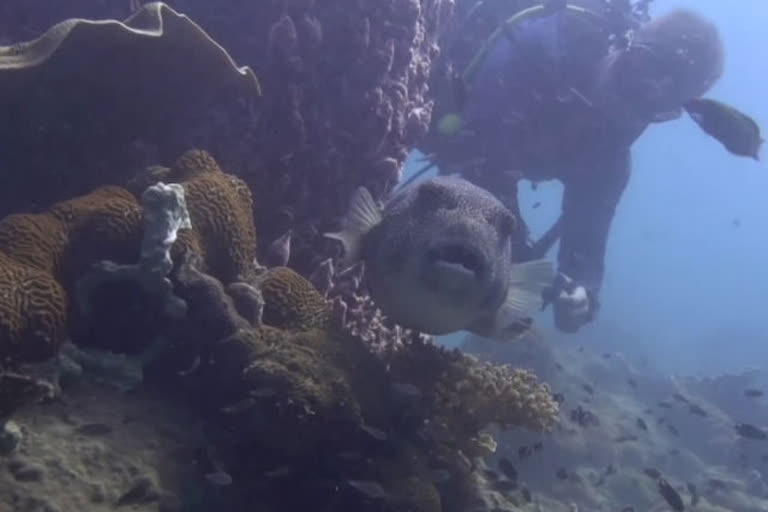Koh S' Dach (Cambodia): The marine environment off southern Cambodia is threatened by overfishing and pollution. In an effort to assess the extent of the problems, a team of international marine scientists is surveying coral reefs in the area.
Divers on the coral reefs off Cambodia's south coast might have the impression that the ocean is thriving, but appearances can be deceptive.
Dragging fishing nets through coral reefs risks getting them snagged so fishermen stay away.
That's good news for fish which breed, shelter and feed among coral reefs.
But while fish remain plentiful on the reefs, locals say numbers in adjacent areas are down in recent years.
Over-fishing and pollution are largely blamed for the fall off.
On Koh S'dach, or King Island, for example, there are around 600 families - more than 3000 people - who rely almost exclusively on fishing.
The region is also heavily fished by large boats from neighbouring Thailand and Vietnam, many of them illegal.
Local fishermen say that fish are becoming harder to find and that they have to go further out to catch them, wasting valuable time and fuel.
In an effort to assess the health of the ocean a team of international marine scientists is surveying the coral reefs in the area.
Their dive is being supervised by Roger Bruget, who's himself a dive instructor and the owner of Kuda Divers.
"Occasionally you will have big soups of actually trash and plastic floating in the ocean. This is obviously very bad for the environment. Other things we will see quite often is discarded fishing nets sitting on the reef and smothering the reef. So actually the plastic itself will move away into the Gulf . Some will end up on the beaches but most of it will actually float away and go into the bigger gyros in the ocean."
The scientists here are from the UK, US, France and Australia.
Their research is funded in part by an NGO called Flora and Fauna International.
They're here to investigate whether there are justified concerns that the removal of fish from the food chain can allow the spread of algae which can smother coral.
The algae also bring bacteria which can kill coral larvae as they are swimming to find a place on the reef to attach themselves.
Plastic pollution is another big problem because it attaches itself to the reefs and spreads harmful bacteria.
In January 2018 Cornell University scientists published a study in the journal Science, which said a third of the corals they'd observed had disease and plastic lodged on them, but they weren't looking for microplastics which could have also been present.
GPS is used to pinpoint where the previous leg of their survey left off.
One of the team, marine scientist Rob Hughes says: "So the reef check surveys that we're doing have established a baseline of information for what is here at this time. And our on-going studies we hope to find empirical information and evidence to say that the fishery is healthy, or if it's improving, or if it's decreasing. So that is what our long term goals are here with the surveys, is to establish the facts about the situation."
The divers carry out Coral Reef Ecosystem Habitat Assessments which involve mapping the ocean floor using a plastic frame and a measuring tape.
Species of plants or animals found are noted and samples are taken for analysis.
The data will be compared to an earlier 2013 study to assess the current health of the ocean.
The surveys are generating baseline data which will be used for the eventual establishment of a Marine Fisheries Management Area covering the Koh S'dach archipelago, only the third marine protected area in Cambodia.
Although it's too early to be certain before the data is analysed, French marine scientist Remy Ouellet says that anecdotal evidence suggests the reefs are still quite healthy, butnumbers of larger marine species in particular are down.
Ouellet explains "So we do see areas with a lot of coral cover and everything is very alive down there, but we do see fewer and what seems like fewer and fewer large fish and things like turtles and marine mammals."
Flora and Fauna International says the results of the survey will be published in about six months.
Last year, according to the International Union for the Conservation of Nature (ICUN) the Cambodian government announced the establishment of a Marine Fisheries Management Area to protect the region.
Also read- Aboriginal history taught to retain doctors
(With inputs from APTN)
